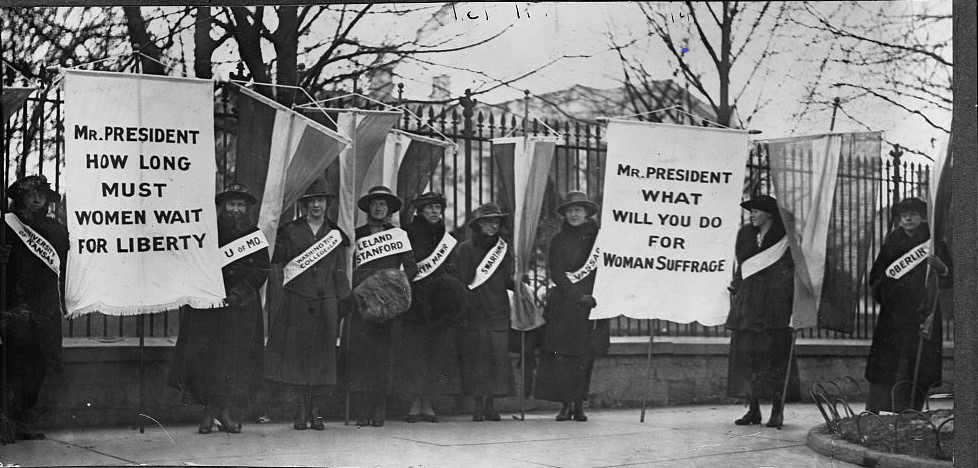Women’s Right To Vote — Why Did Suffrage Take A Century To Achieve?

How long must citizens wait for their rights?
As America celebrates the 100th anniversary of the 19th amendment, some might wonder how a right as fundamental is casting a ballot took the same number of years to come to fruition for female voters. And what might even be more questionable than that is how such a right took longer for minority women, specifically Chinese immigrants and African Americans.
The leaders, known as suffragettes, who championed the cause in the 1820s started small; they organized grassroots campaigns inspired by movements in other countries where women eventually would secure the right to vote, such as New Zealand in 1893, Australia in 1902, Finland in 1906 and Norway in 1913.
“Any CHEER for the centennial of women’s right to vote has to be modified by a JEER for how unfathomably long it took before all females in America had that basic right,” states the Press-Republican. “America is celebrating the 100th anniversary of the passage in 1920 of the 19th Amendment, which made it legal for white women to vote. It was a long and frustrating road for women to get to that point. And the angst would continue for women of color for many more years.”
The 19th Amendment was ratified in 1920. Many early supporters did not live to see the signed document.
“Want to know the best way we can honor those amazing women who fought for decades for a right that should have belonged to every American from the start?” the Press-Republican asks? “Celebrate their achievement on this centennial, for sure. But also demand that every American has the opportunity to vote this Nov. 3, despite the challenges posed by politics, discrimination and COVID-19.”
It is difficult to imagine a world in which women could not go to the polls based on gender discrimination – then and now. In the United States, women comprise one of the most crucial voting blocs in elections, often determining the fate of both houses of Congress and the nation. Democratic and Republican candidates can be crushed – or carried – by the mothers, daughters, sisters and aunts of the country.
“Most people these days, if told that a country does not allow women to vote, would assume it to be a backward, third-world nation,” according to the Press-Republican. “When, in 1870, the 15th Amendment allowed men of color the same voting rights as white males, women still could not help decide who would lead their communities, state or nation.”
Chinese immigrants received the right to vote 23 years after white women – in 1943 – with the passage of the Magnuson Act. It was not until 1965 that African-American women received the right.
“And getting approval to vote doesn’t mean it was easy to do so, especially for women of color,” according to the Press-Republican. “They still faced harassment even after having achieved the legal right. Imagine the fortitude and bravery of all the women involved in the suffrage movement. They faced anger and insults from most men and were shunned by other women who saw them as rabble rousers who didn’t know their place.”
Suffragettes marched on Washington, stood in picket lines in front of the White House, went on hunger strikes, wound up in jail because of their actions and endured forced feedings behind bars. Some lost their lives.
“It’s often called the War of the Roses,” Elaine Weiss, author of The Woman’s Hour: The Great Fight To Win the Vote, told NPR in a story titled “The Nudge And Tie Breaker That Took Women’s Suffrage From Nay To Yea.” “There are threats of kidnapping. There are fistfights. There are even death threats, and the governor has to order state troopers to guard some of the suffrage leaders in the legislature. It gets very ugly, and you see that the stakes are quite high. This is the moment which can decide whether American women are going to be allowed into their nation’s democracy.”
Weiss is referring to Republican Tennessee Rep. Harry Burn, who broke the tie vote in the state legislature and made history.
“The 19th Amendment is ratified,” Weiss says in the story. “And then all hell breaks loose. You have the suffragists screaming and crying and throwing their yellow roses down onto the legislators, and the anti-suffragists are just stunned and horrified, and they’re hissing and screaming at Harry Burn.”
To say that the events unfolded dramatically is an understatement.
“That change of vote enfranchised millions of women,” Suffrage Coalition President Wanda Sobieski told NPR. “Twenty-seven million women got the right to vote.”
For information about voting, visit www.vote.org.
Share This


